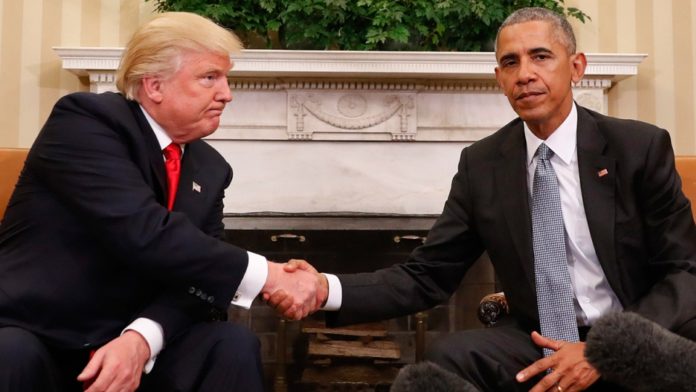Introduction
The US still wields considerable economic power and possesses unmatchable military potency at the international level. The entire world closely watched the debates between Democratic nominee Hillary Clinton and Republican hopeful Donald Trump for the most powerful position in the world, the US President. The hawkish and incendiary language of firebrand Trump against China, Russia and Islam led an overwhelming number of think thanks and experts of American politics to predict the sweeping victory of Mrs. Clinton. Out of the blue, Donald Trump has defeated his Democratic rival by winning some 290 seats of the Electoral College while Hillary Clinton grabbed only 232 seats. Now, Trump has been declared as the 45th American president-elect who will take charge of the Oval Office on 20 January 2017. What is most important is the projected foreign policy of the businessman-turned politician. He used an incendiary and hawkish language against the Muslims, Mexico and China, etc. during his much-hyped elections canvassing. This piece is an attempt to directly spell out the details of projected but abstruse external policy of President-elect Donald Trump and its impacts on the anarchic world.
The World left by President Obama for President-elect Donald Trump
After formally taking over as American president in January next year, Trump is likely to confront a deeply unstable world left by incumbent President Barack Obama: the oil-rich Middle East is in turmoil due to the lingering civil wars in Syria, Yemen and Libya; the rampaging militancy of Islamic State/ Daesh and rising terrorism of Al Nusra Front and Al-Qaeda ominously continue to batter the war-stricken Middle East; the Iran-Saudi rivalry for carving out spheres of influence is threateningly on the rise; the European Union (EU) is reeling from a bout of terror attacks and the Brexit; Russia is rapidly expanding its influence around the Mediterranean Sea and challenging its neighbors in East Europe; ever-rising China is flexing its muscles both militarily and economically in South Asia and in the disputed waters of South China Sea; large swathes of war-torn Afghanistan are now under Taliban attacks and IS-Khorasan is bent upon increasing its footholds there; North Korea is set upon expanding its secret nuclear programme both horizontally and vertically to the detriment of American regional security allies and the specter of a catastrophic war between Pakistan and India is hanging like the Sword of Damocles.
Therefore, some significant questions may be raised with regard to Trump’s ambiguous external policy as the American president: Will he adopt a dovish or hawkish approach toward America’s top rival, Russia? How will he deal with the Chinese assertiveness in the South China Sea against American allies? What will be his policy toward the simmering civil wars in war-torn Syria and Yemen and the rampaging militancy of Daesh in the Middle East? What will be his approach to the Iran nuclear deal and the long-drawn-out Israel-Palestine dispute? What policy will he adopt towards South Asia, especial towards India, Pakistan and war-stricken Afghanistan? And how will he deal with the menacing nuclear programme of North Korea?
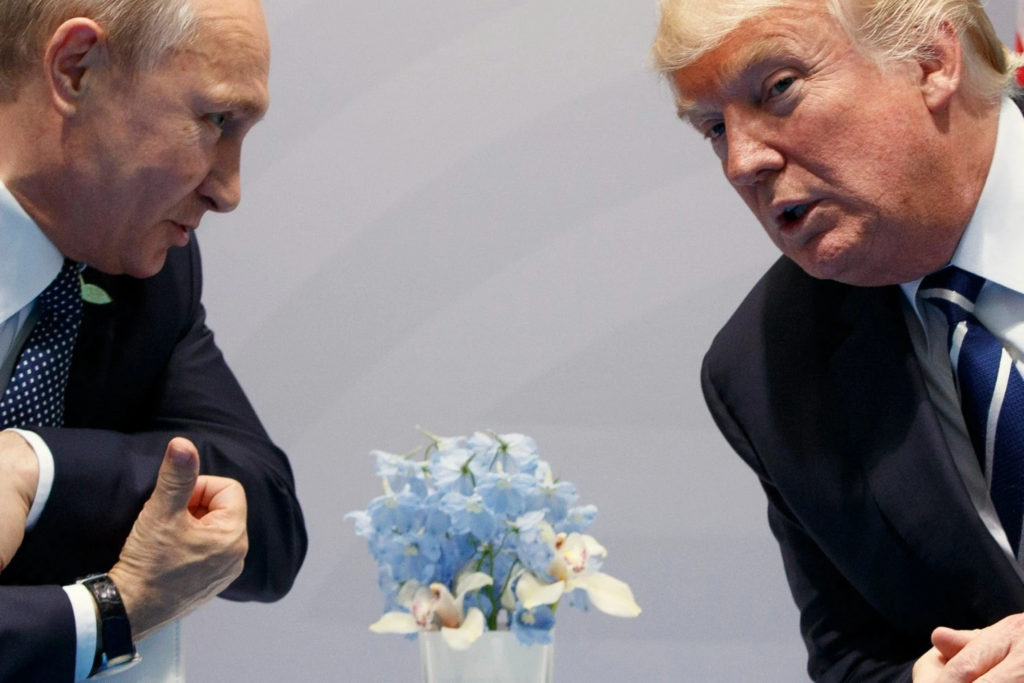
America-Russia Relations in the Backdrop of Syrian and Ukraine Crises
Under President Vladimir Putin, Russia has been heavily engaged in expanding its power and influence since March 2014. It has annexed the strategically important Crimea and expedited its aerial bombardments in war-ravaged Syria in a systematic bid to increase its ever-increasing tentacles in the Mediterranean Sea. A raft of Russian hackers has continued to systematically penetrate the high-level networks of the US, thus creating severe security risks for Washington. This has brought about escalating cleavages between both countries by ominously heightening the already swelling tensions between the two major powers.
Trump has been less scathing and somewhat friendly and amenable toward Russia under President Putin. In his elections debates, he categorically opined that he would mend his ways with President Putin and cultivate amicable relations with him so as to jointly flush out Daesh in the militancy-battered Middle East. On 27 April’s speech in Washington, DC, he unambiguously said: “I believe an easing of tensions, and improved relations with Russia—from a position of strength only—is possible, absolutely possible. Some say the Russians won’t be reasonable. I intend to find out.”
Presumably, Trump will direct much of his focus on the long-drawn-out war of Syria as a significant part of his Middle Eastern policy. Though most of the security analysts consider him a businessman bereft of feasible and effectual thought of bringing an agreed end to the deadly Syrian war, he will be able to adroitly tackle the surging Syrian quagmire in a relatively more pragmatic and effective way than outgoing President Obama. To put a decided end to the raging Syrian war, he unequivocally backed up Russian airstrikes against IS, and also floated the idea of forging a militarily potent alliance with Moscow. In his wide-ranging interview with CNN’s Don Lemon on 1 October, 2015, Trump said: “If Vladimir Putin wants to launch airstrikes inside Syria, that’s no problem for me, and I believe Russia’s military moves in Syria are targeting ISIS and that the United States shouldn’t interfere”. “Trump’s expressed admiration for Putin’s strong leadership may open the door to cooperation in addressing the Syrian conflict. If Trump’s priority is to crush IS, he could agree to allow Syria’s Assad to survive, thus coalescing with Moscow’s approach. “Protectionist barriers, such as punitive duties on imports from China and Mexico, will provoke trade retaliation; while increasing the cost of consumer goods, it will bring few jobs ‘back’ to America’s uncompetitive manufacturing industries,” wrote Munir Akram in his latest opinion titled “Trump’s America” in Dawn.
Arguably, if both Russia and the US create an alliance with some regional Arab countries, they will succeed in stamping out not only Daesh but also other assorted and ragtag terrorists and militant outfits freely operating from the terror-infested Syrian soil. After that, it will be relatively easy to bring Assad and varied rebels on the negotiating table with the intent to bring an end to the lingering civil war.
However, it is still unpredictable whether Trump will indefinitely continue to train, finance and arm some vetted terrorists and rebels in Syria against belligerent Syrian President Bashar al-Assad. If Trump does so, he will have to ably dissuade enraged American Arab allies from uninterruptedly supplying sophisticated arms and ammunitions and funnelling substantial money to some militant and rebel groups stringently arrayed against the crisis-ridden Assad regime in Syria. The Arab countries will stop supporting rebels only when both Russia and America seem to have apparently succeeded in convincing Assad to agree to serious and result-oriented peace negotiations and elections in the country.
A BBC report titled “Syria crisis: Where key countries stand” makes the position of Arab countries on Syrian war clear that, “The Sunni-ruled Gulf kingdom ( Saudi Arabia) says President Assad cannot be part of a solution to the conflict and must hand over power to a transitional administration or be removed by force.” More importantly, Trump will also need to deal with the ideological rivalry between Iran and Saudi Arabia in Syria; both the countries have been immersed in supporting conflicting sides to maximise divergent objectives. All this manifestly shows that Trump will face a somewhat bumpy road ahead in terms of ending Syrian civil war.
As far as Russian annexation of Crimea is concerned, Trump has repeatedly voiced that he will avoid vehemently opposing Russian incursion of Crimea and consider the strategically important Crimea a significant part of Russia. Molly O’Toole penned down a short piece in the Foreign Policy magazine back in 14 September, 2016 that: “Trump has suggested he’d recognise Crimea as part of Russia if elected.” In Trump’s opinion, it is better to leave Crimea to be with Russia so that he can cultivate robust diplomatic ties with Putin. “The people of Crimea, from what I’ve heard, would rather be with Russia than where they were. And you have to look at that,” confidently said Trump. A question can be raised about Trump’s magnanimous behavior towards Putin that: Does Trump wish to calibrate and pursue pacifist and manipulative policy toward Russia in order to convince or trick Russia to avoid occupying smaller nations or he is badly lacking the requisite acumen and cerebral power needed in dexterously dealing with complicated external and diplomatic affairs? The answer will be clear enough after one year of Trump’s hold over the Oval Office as the captain of the American ship.

America-China Relations
According to the renowned structural realist, John J Mearsheimer, the Chinese economic and military rise in the 21st century would not be peaceful; the US could employ all means, fair or foul, to contain and impede China from challenging American hegemony in the world. The cut-throat competition between both countries has awakened a dormant cold war atmosphere in certain regions.
Under Trump, the Pentagon, Capitol Hill and all other American decision-making quarters will be heavily engaged in crafting strategies on how to encircle, counteract and hamper China, thus slowing down the Chinese economic boom and military rise. Though the Chinese rise is relatively peaceful, the powerful communist state is still fully prepared to promptly respond to any aggressive American posturing against its national interests across the world.
According to a recent report issued by the Wall Street Journal, Trump has persistently described China as one of the US’s top adversaries, particularly when it comes to economic policy. He says he would label China as a currency manipulator, crack down on hacking and threaten the Chinese government with steep tariffs if it doesn’t agree to rewrite trade agreements. Being a successful businessman, Trump is probably well-acquainted how to deal with China, especially in terms of placing formidable roadblocks in the way of Chinese economic growth so as to slow down its fast growth. But there exist wide differences between dealing with personal business and the economy of a world power that has stakes from the Atlantic to the disputed waters of the South China Sea.
As par the data of CNN, $659,000,000,000 is the total trade value of goods and services between the US and China. Their economic relationship is crucial not only to each country’s financial health but to the global economy as well. Despite this, Trump seems to consider rapid Chinese industrialisation and economic growth inimical to the industries of the US and job opportunities for the American citizens. In his June 28 speech, he brashly hit out against China in these words: “China’s entrance into the World Trade Organization has enabled the greatest jobs theft (of American citizens) in history.” Presumably, after his election as president, he may adopt a policy of moderate economic protectionism against Chinese products with the intent to safeguard local industries. In this regard, major steel barons and lobbies in Washington will bankroll and throw their support behind Trump in the Congress, respectively. Then, such protective policies will prompt China to reciprocate with similar obstructive measures. This will cast a serious and disruptive drain on the growing economic relations between both countries.
In the restive South China Sea, China is having disputes with other South-East Asian countries over the Spratly Islands, the Paracel Islands, the Pratas Islands, the Maccles field Bank and the Scarborough Shoal. There are precious minerals, natural gas and oil deposits on and under the seafloor of these islands. For its national security, China is also building military, naval and air bases on some of these highly disputed isles. A number of artificial islands have also been constructed for Chinese military objectives. The US considers such strategic moves from China not only a grave threat to the very security of its regional allies and but also to its dwindling regional economic dominance. “The South China Sea is also one of the world’s most important shipping waterways. Trillions of dollars of goods pass through it every year — and the US is concerned that China’s expansion could eventually allow them to control the waterways outright, and therefore the ability to impact the free flow of trade”, wrote Matt Rivers, a geo-political analyst associated to CNN.
To counter China’s growing presence in the region, the US has adopted ‘strategic hedging’: It has recalibrated its ‘pivot’ towards the Asia-Pacific region, lethally armed its regional allies and deliberately violated the Chinese Exclusive Economic Zones time and again. As a result, both the countries have also hurled threats against each other in the restless region.
President-elect Donald Trump fearfully deems the Chinese military rise in the South China Sea as a threat to American regional allies. In his foreign policy debates, he repeatedly said that he would further expand the US’s military presence in the disputed waters of South China Sea as an effectual deterrent to increasing China’s territorial claims to artificial islands there. What Trump should not clean forget is that the key and strongest American ally, the Philippines, has recently jumped into the Chinese regional bandwagon under the new President Rodrigo Duterte. “On a recent trip to Beijing, Duterte said he wanted separation from the US both economically and militarily, and pursue closer relations with China,” said Rivers. All this shows that the belligerent policy of America against China in East Asia has dismally failed to ensure the very security and burgeoning economic interests of East Asian countries.
Trump frequently uttered very strong words about American spending and assurance of defence of its East Asian security allies. He promised to his voters that if elected as president, he would instigate or compel Japan, Taiwan and South Korea to pay for their security. “The strongest US allies, Taiwan, South Korea and Japan, no longer confident in the US nuclear umbrella, will begin seriously considering other alternatives — like acquiring their own nuclear deterrent, prompting new tensions with China,” wrote James Palmer in his latest opinion in Foreign Policy magazine titled “China just Won the US Election”.
Trump’s hawkish and non-diplomatic language has brought about uncertainty and confusion for the security alliances of America with the regional counties. Surprisingly, due to American commitment to defending the security of its East Asia allies, the latter have not by far raised well-trained and full professional defence forces since the end of WWII. If Trump imprudently continues the abortive counter-China policy of outgoing Obama, he will, lose more and more economically developed American allies to China time after time. Ominously, some East Asia countries would also embark upon commencing their own nuclear programmes and building strong arms with advanced and lethal weaponry as a shield and deterrent to nuclear South Korea. “Countries like Vietnam, Myanmar and the Philippines, uncertain about who to back in the contest for power in the Pacific, will swing massively China’s way, preferring a country that keeps its promises to one that can turn on the pull of an electoral lever,” wrote Palmer “the strongest US allies, Taiwan, South Korea, and Japan, no longer confident in the US nuclear umbrella, will begin considering other alternatives — like acquiring their own nuclear deterrent, prompting new tensions with China,” warned Palmer.
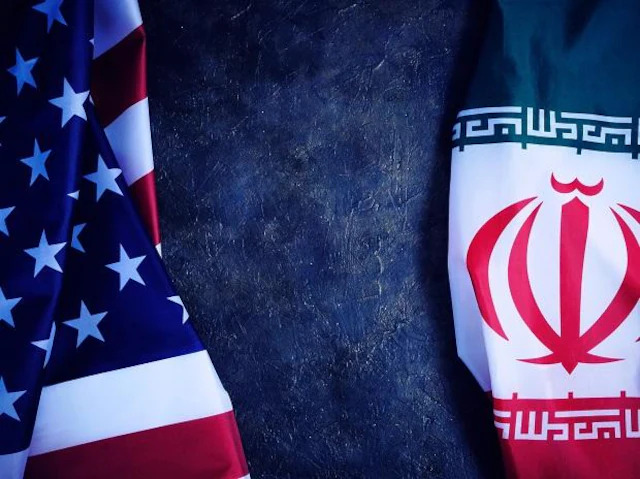
American- Iran Relations: The Fate of Iran Nuclear Deal
After the successful nuclear deal, Iran has increased its economic and military sway in the Middle East. At present, Iranian troops and proxies are engaged in backing up Assad forces in Syria, Houthi rebels in Yemen and Shia forces in Iraq. After the continual release of billions of dollars of Iranian assets by America, the Islamic Republic is expected to augment its military tentacles in the region; a move to counter or balance rising Saudi influence in the Middle East.
Everything will change radically if Trump translates his anti-Iran rhetoric into actions which he made during his election campaign. Donald Trump has been quite critical of the Iran nuclear deal since July 2015. He said: “Iran is a very big problem and will continue to be. But if I’m elected president, I know how to deal with trouble.” Arguably, his statements and perspective seem to have been immensely influenced by the pro-Israeli lobbies active in Washington that continue to vehemently oppose the accord on the Iran nuclear programme. “My number one priority is to dismantle the disastrous deal with Iran,” he told the American Israel Public Affairs Committee in March this year.
According to him, the US allowed Iran to access $150 billion in money that had been frozen. He has proposed renegotiating the nuclear deal, though it’s unclear exactly how he would structure any agreement. He has called for doubling and tripling the sanctions the US had historically placed on Iran as a way to force them toward more concessions. He has said he would “dismantle” the deal, but aides have said he would only seek to refine it. His precise plan is unclear.
The recent reports of some international nuclear watchdogs about Iranian violation of the deal will possibly make the work of Trump easy to either renegotiate or repeal the deal. The United Nations’ nuclear watchdog, the International Atomic Energy Agency (IAEA), recently reported that Iran has been in violation of one term of the nuclear deal. According to IAEA, specifically, Tehran has accumulated an excess of heavy water, a key material for a nuclear-weapons program, in recent weeks. The Obama administration has, however, played down the report, stressing that Tehran has committed to quickly shipping the excess heavy water to a third country and remain compliant with the deal.
Since Trump wishes to work with Putin in bringing an end to the Syrian civil war, then this will be quite difficult for him to abrogate the deal with Iran. Moscow and Tehran not only enjoy robust economic and defence relations, both also fully cooperate with each other in Syria to shore up the Assad regime. “I don’t see how Trump could so directly challenge the Iran deal if he hopes to work with Putin in places like Syria,” said Andrew Tabler, a Mideast expert at the Washington Institute for Near East Policy, a US think tank. “You would have to split those two positions, and now they are not.”
If Trump rescinds the historic deal, this will backfire and haunt him during his stay as the American president. After making the deal null and void, Iran will probably re-start and accelerate its stalled nuclear programme to acquire a bomb as soon as possible. As a result, this may provoke Israel to think of launching an attack on Iranian nuclear programme with the limited support of some Arab countries. Some Middle Eastern countries, especially Saudi Arabia, will commence their own nuclear programmes as they have already signalled to do so. This will not only spark off a dangerous nuclear arms race, but also further fuel insidious civil wars, militancy, sectarianism and Shia-Sunni conflicts in the region. “An angry Iran could complicate the conflicts in the Middle East,” said Akram.
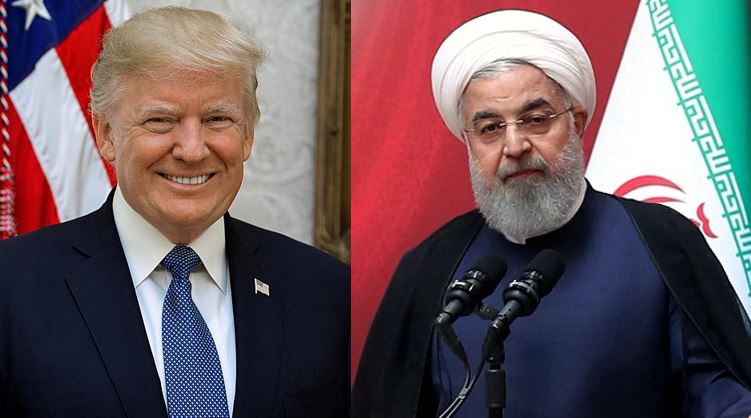
Trump on Palestinian Issue
Under the Obama administration, relations between the US and Israel have experienced a downward trajectory on account of Washington’s historic nuclear deal with Iran. It goes without saying that Israeli powerful lobbies and industrial barons play a significant role in the US politics; they employ their wealth to influence the legislative process in both the House of Representatives and the Senate. A large number of US politicians seek financial and related assistance from Jewish lobbies on the eve of their elections. Similarly, the main Israeli lobby in the US, the American Israel Public Affairs Committee (AIPAC), had been engrossed in funding the canvassing, debates and campaigns of Trump aimed at influencing his policies after winning the upcoming presidential elections.
In his March 21 speech in Washington, DC, Trump said: “When I become president, the days of treating Israel like a second-class citizen will end on day one.” Trump has advocated for more US military support for Israel, and worked to build bridges with Tel Aviv by slamming the nuclear deal with Iran. According to the Wall Street Journal, he displayed his inclination to remain neutral in any peace talks between Israeli and Palestinian leaders. He later softened his position, saying it would be very difficult to remain neutral. In his convention speech in Cleveland, he called Israel “our greatest ally in the region.”
All this makes the US foreign policy toward the Palestinian issue clear that the US will continue to block any measures of the UNSC pertaining to the independence of Palestine. Moreover, he will increase the amount of annual American defence grants to Israel and augment arms and technology supplies to the Jewish state in the Middle East. Under his administration, Israel will continue its bouts of dastardly acts of killing innocent Palestinians and the US will be providing the needed support at all international forums under the pretext of Israeli security. Trump, unlike his predecessors, is reportedly prepared to turn a blind eye to the issue of Israeli settlements that are being built on the occupied lands that Palestinians want for their future state.
Trump on North Korea
North Korea has continued to expand its secret nuclear programme while threatening to launch massive attacks in case it is threatened by the US or its allies in the region. According to a report of the PBC, US experts estimate that North Korea has 13 to 21 nuclear weapons, and could have as many as 100 by 2020. It has conducted four underground nuclear test explosions since 2006. The most recent test was in January, when it claimed to have detonated hydrogen bomb — a much more powerful device than in the previous tests — although the US government doubts that claim. North Korea is also working on ways to deliver nuclear weapons.
After five failures, it successfully test-launched in June a ballistic missile that puts US military bases in South Korea, Japan and Guam within reach. North Korea has displayed an intercontinental missile that could potentially hit the mainland US, although it has not yet been flight-tested. It could take several more years to perfect that missile, which can be moved by road, making it harder to destroy pre-emptively. The US military has said North Korea may by now have developed a nuclear warhead small enough to mount on such a missile.
North Korean hackers have continually carried out cyber attacks around the world, especially on the security programmes of the US. The crushing sanctions imposed by the US have not worked effectively to hinder the North Korea regime from limiting its nuclear programme.
Donald Trump said: “President Obama watches helplessly as North Korea increases its aggression and expands further and further with its nuclear reach.” Trump is inclined to pressure China to crack down on North Korea’s development of nuclear weapons, and has called North Korea leader Kim Jong Un a “maniac.” However, he repeatedly said that he would withdraw US troops from South Korea. It should be noted that the US keeps 28,500 troops based in neighbouring South Korea as a deterrent force, a legacy of the 1950-53 Korean War that ended without a formal peace treaty. He’s also ready to meet the North Korean leader. Whether Trump will be successful in having North Korea limited and scraped its nuclear programme will be clear in next year.
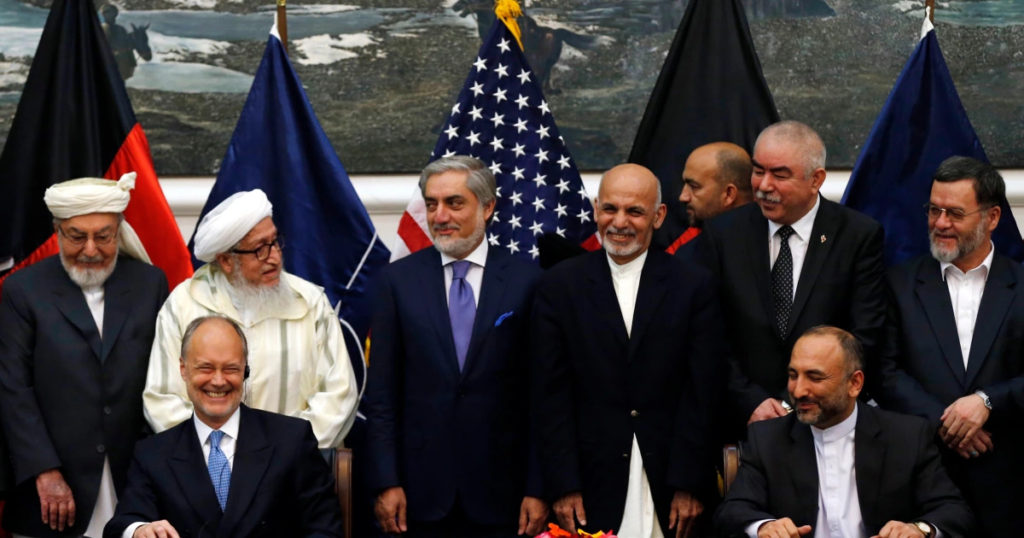
American Policy towards South Asia
Despite United States spending of some $115 billion in aid for Afghanistan in 15 years, a third of the country is still out of government control and security forces are struggling to retake the lost areas. Arguably, the US will not permanently withdraw its nearly 10,000 troops from Afghanistan after signing the Bilateral Security Agreement (BSA) with Kabul in 2013. According to Reuters, So far, Trump has shown little interest in Afghanistan, although his most recent comments suggested he favoured keeping troop numbers at around 5,500, the level they were intended to reach by the end of the year before Obama shelved the plan and set the number at 8,400.
The underlying reason is that the US will use Afghan soil to watch and monitor Pakistan’s nuclear programme and contain China with all-out Indian help. Uncle Sam will make Daesh’s looming specter in Afghanistan an excuse to station its combat forces in the country. Resultantly, frail peace and instability will continue to haunt the Afghans during the Trump administration without any peace prospect.
As far as Pakistan and India are concerned, the next US administration will continue its “do more” mantra and pressurise Pakistan to clamp down on all terrorist and militants groups reportedly based in its tribal areas. More importantly, the Trump administration will exert some hectic backstairs influence to have Pakistan’s growing nuclear programme slowed down. “Pakistan is a very, very vital problem and really vital country for us because they have nuclear weapons and they have to get a hold of the situation,” he said while being interviewed by CNN anchor Anderson Cooper. This will leave some obstructive impacts on Pak-US relations and the ongoing war on terror.
Donald Trump has hinted at playing the role of a “mediator or arbitrator” in appeasing the current flare-up of tensions between India and Pakistan. “If it was necessary I would do that. If we could get India and Pakistan getting along, I would be honoured to do that. That would be a tremendous achievement… I think if they wanted me to, I would love to be the mediator or arbitrator,” Trump said in response to a question during an exclusive interview with the Hindustan Times. However, Trump will not change the US stance on Kashmir as a bilateral issue between Pakistan and India and that both countries should resolve it through the bilateral process.
Trump will undoubtedly continue his predecessor’s policy of fostering robust economic and defence ties with India. The US will increase its economic ties with India due to the growing consumer market of the latter. “If I’m elected president, the Indian and Hindu community will have a true friend in the White House, that I can guarantee you,” said Trump at an event sponsored by the Republican Hindu Coalition to raise money for victims of terrorism. “We will defeat radical ‘Islamic terrorism” when I’m president. We will stand shoulder to shoulder with India in sharing intelligence and keep our people safe mutually,” he added.
More significantly, he will ratchet up diplomatic endeavours to help India acquire membership of the Nuclear Suppliers Group (NSG) and the permanent seat at the UNSC. Moreover, defence ties between India and the US will be increased under the direction of pro-Indian upcoming US president. This does not bode well for the fragile peace and security of South Asia because it will bring forth a nuclear arms race between Pakistan and India and upset the nuclear balance of power in the region.
US-Mexico Relations
As seen, immigration became as one of the most divisive issues of the 2016 campaign, with Republicans reversing course from an earlier push to enact a bipartisan overhaul of immigration rules. According to the Wall Street Journal, immigration from Mexico and Latin America has traditionally been a flashpoint in US politics, but in recent months the focus has shifted to immigration rules for people fleeing places like Syria and other unstable regimes in the Middle East. Trump said: “When Mexico sends its people, they’re not sending their best…They’re sending people that have lots of problems, and they’re bringing those problems with us. They’re bringing drugs. They’re bringing crime. They’re rapists.”
Trump has called for building a roughly 1,000-mile wall, financed by Mexico, to secure the US’s southern border. Until this wall is built, he has promised to “impound” all remittance payments “derived from illegal wages” sent from people in the US to Mexico. He wants to triple the number of Immigration and Customs Enforcement officers, and has also proposed deporting the roughly 11 million undocumented immigrants believed to be currently living in the US and enhancing penalties for people who overstay visas.
Conclusion
The US always strives to maximise its national interest, national security and its hegemony globally. Under Trump, though Uncle Sam cultivates somehow amicable ties with Russia, it is likely to be engaged in a cold war with China in South Asia, East Asia and in the Middle East. Renowned Greek philosopher Plato still sounds relevant that: “Only the dead have seen the end of war.”


